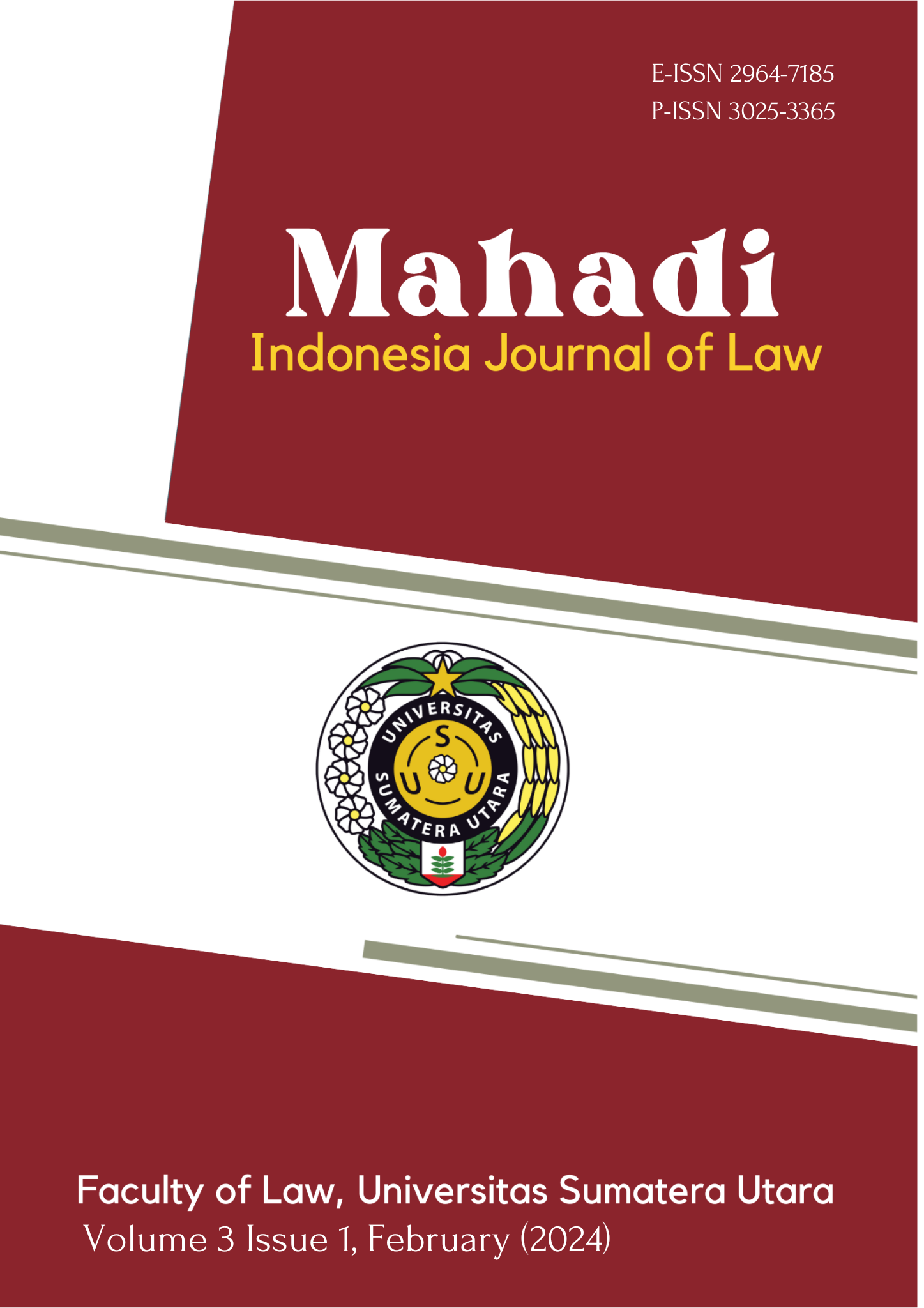Implementation of the State of Law Principles from the Constitutional Law Perspective: A Case Study of Legislative Aspects in Law Enforcement in Indonesia
DOI:
https://doi.org/10.32734/mah.v3i01.15452Abstract
The Fourth Amendment to the 1945 Constitution of the Republic of Indonesia, enacted in 2002, officially established the concept of the State of Law, or "Rechtsstaat," which was previously only mentioned in the Explanation of the 1945 Constitution. This concept was solidified in Article 1, paragraph (3), which states, "The State of Indonesia is a State of law." This study utilizes a normative legal research method, focusing on document analysis using various secondary data sources such as legal literature, court decisions, legal doctrines, and expert opinions. The research's analysis centers on the implementation of the rule of law principles within the constitutional framework, with a specific focus on legislation and law enforcement in Indonesia, particularly in the legislative domain. Despite efforts to reform legislation, there are still deficiencies in the legislative process that may hinder the effective implementation of the rule of law principles. Some challenges include inconsistencies in laws, the intricate nature of the legislative process, and potential political interventions that could compromise the independence of legislative bodies.
Downloads
References
AB Wibowo et al., Challenges of Law Enforcement in Indonesia: Case Study of Corruption Cases, J. Peelit. Huk., Vol. 5, No. 2, pp. 112-130.
Asshiddiqie, Jimly, Negara Hukum (Rule of Law): Konsep, Teori, dan Implementasi di Indonesia, Jakarta: Alma Mater, 2010.
Asshiddiqie, Jimly, Pengantar Hukum Tata Negara, Jakarta: RajaGrafindo Persada, 2015.
Budiardjo, Miriam, Dasar-Dasar Ilmu Politik, Jakarta: PT. Gramedia Pustaka Utama, 2008.
Haposon Siallagan, Penerapan Prinsip Negara Hukum di Indonesia, Sosiohumaniora, 2016, Vol. 1, No. 3, p. 135.
Hayat, Justice as a Principle of the Rule of Law: A Theoretical Review in the Concept of Democracy, Padjajaran Jurnal Ilmu Hukum, Vol. 2, No. 2, 2015, p. 392.
Indra Perdana, Prinsip Negara Hukum dalam Kehidupan sebagai Warga, Jurnal Warta Dharmawangsa, 2016, Vol.1, No. 2, p. 127.
JS Pranata et al., 'Legal Reform in Indonesia: A Review of the Law Making Process, J. Law and Development., Vol. 2, No. 1, pp. 45-60.
Maksum Rangkuti, Ap aitu Keadilan Hukum?, UMSU Faculty of Law Journal, Vol. 2, No. 1, 2023, p. 112-116.
Marzuki, Mahmud, Peter, Penelitian Hukum, Jakarta: Kencana, 2006.
Putera Astomo, Prinsip-Prinsip Negara Hukum Indonesia Dalam UUD NRI Tahun 1945, West Sulawesi University Journal, Vol.2, No. 2, 2019, p. 215.
Undang-Undang Nomor 26 Tahun 2000 tentang Peradilan Hak Asasi Manusia
Undang-Undang Nomor 30 Tahun 1999 tentang Hak Asasi Manusia
UUD NRI Tahun 1945
Yusnus Suhardi Ruman, Keadilan Hukum dan Penerapannya dalam Pengadilan, Humanities, Vol. 3, No. 2, October 2012, p. 348.
Zulkarnain Ridlwan, Negara Hukum Indonesia Kebalikan Nachtwacherstaat, Fiat Justitia Journal of Legal Studies, Vol 5, No.2, August 2011. p. 142.
Downloads
Published
How to Cite
Issue
Section
License
Copyright (c) 2024 Zainal Abidin Pakpahan, Ananda Sabillah Yasmin, Indri Tiya Safitri; Elian S Christoper Nainggolan; Thorique Akbar Maulana Nasution

This work is licensed under a Creative Commons Attribution-ShareAlike 4.0 International License.











